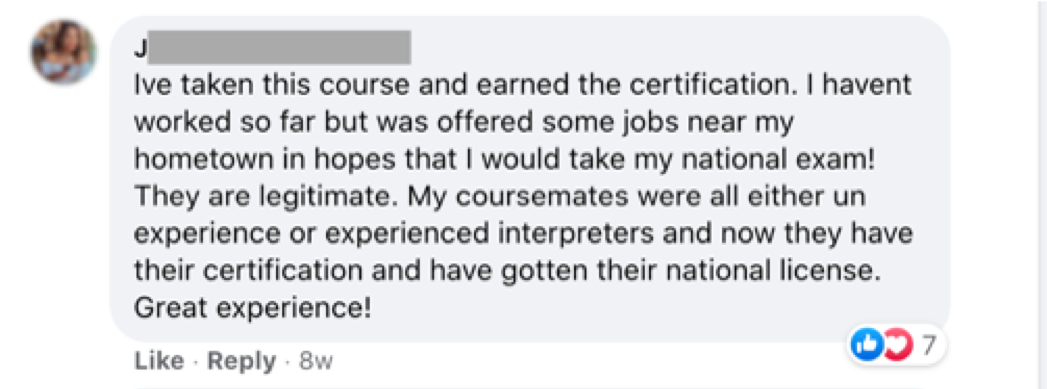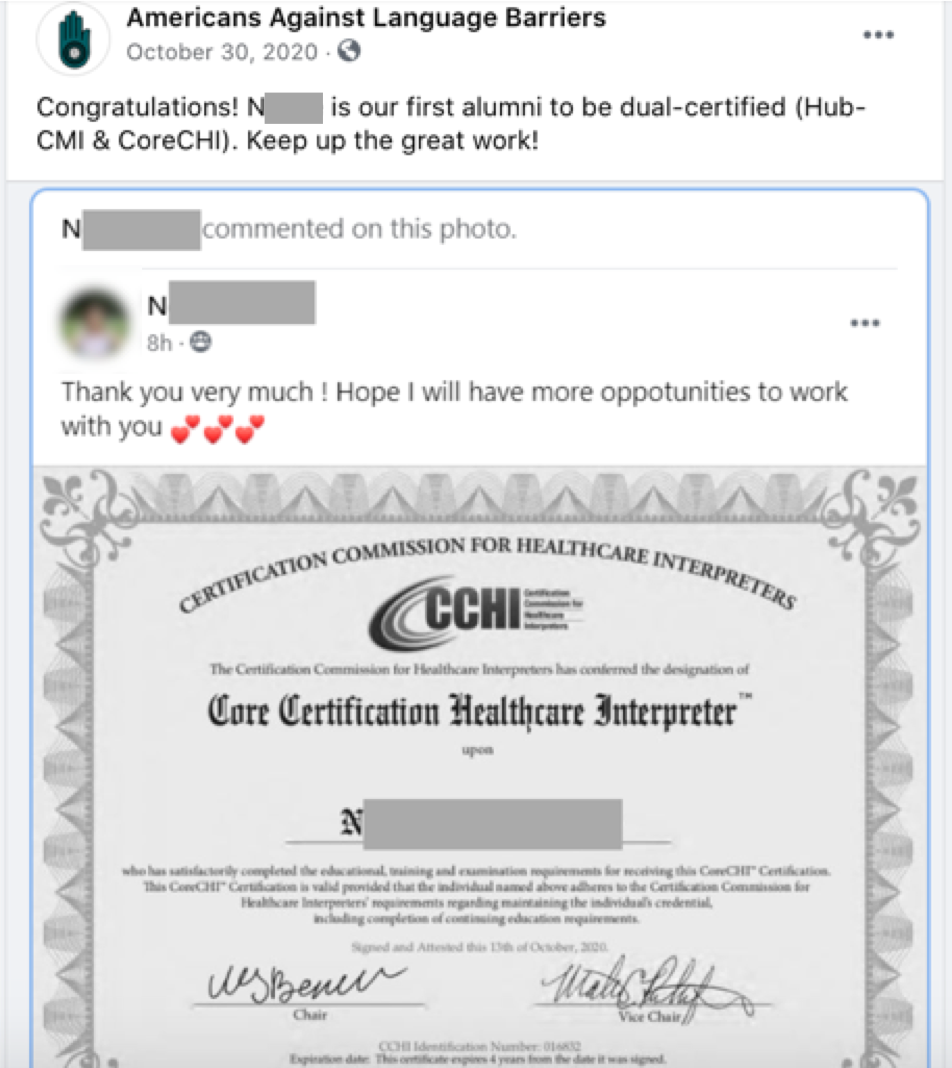Take a look at what some of our graduates have to say on Facebook!



















Americans Against Language Barriers (AALB) is a 501(c)(3) non-profit organization dedicated to improve the health of patients with limited English proficiency. AALB's Medical Interpreter Training Program is a 100% online, 8-week, 60-hour course that qualifies individuals to work as professional medical interpreters in all 50 states. The program is taught by experienced, highly accomplished, nationally certified professional medical interpreters. No prior experience with interpretation or prior work in the medical field is required. AALB's Medical Interpreter Certificate of Training is recognized by the Certification Commission for Healthcare Interpreters (CCHI), the National Board of Certification for Medical Interpreters (NBCMI), and the Registry of Interpreters for the Deaf (RID).

View sample course lectures

Access continuing education videos

Get guidance on becoming a medical interpreter

Qualify to work as a professional medical interpreter in any state

Earn AALB's nationally recognized Certificate of Training

Learn from award-winning instructors

Train with 60 hrs of content, 100% online

Receive expert support throughout
A: Graduates of AALB's Medical Interpreter Training Program are qualified to work as a medical interpreter in healthcare settings throughout the United States. Some states may have additional requirements for sign language interpreters; AALB will help guide graduates focused on sign language interpretation through these requirements. AALB's training course additionally qualifies students to sit for the certification exams offered by the Certification Commission for Healthcare Interpreters (CCHI) and the National Board of Certification for Medical Interpreters (NCBMI). These are the highest qualifications medical interpreters can obtain in the United States. Though the CCHI and NBCMI certificates may be optional for certain employers, we encourage graduates of our program to become certified through either or both of these organizations in order to further distinguish themselves and potentially earn an even higher income.
A: Our follow up surveys indicate that alumni of the AALB Medical Interpreter Training Program earn an average of $32.80 per hour as professional medical interpreters. According to the U.S. Bureau of Labor Statistics, interpreters and translators employed by a hospital earned a median salary of $50,980 in 2019. However, most interpreters are self-employed and work as contractors for agencies; they may command higher wages and have greater independence as contractors, but they do not have guaranteed hours like employees. Therefore, many interpreters will work for multiple agencies, and have the ability to be selective about when they work & how much they charge for their professional services.
A: All students must be proficient in English and at least one other language (spoken or signed). To demonstrate proficiency in a second language, passing a Dual-Language Proficiency Screening Test (within 2 attempts) is required as part of the application process. All languages are welcome, as the training is language-neutral. A high-speed internet connection with a computer, a microphone, & a webcam are required. Learn more about our policies and procedures for the course.
A: The certifications offered by the Certification Commission for Healthcare Interpreters (CCHI) and the National Board of Certification for Medical Interpreters (NCBMI) allow medical interpreters to demonstrate their professional knowledge, skills, and abilities based on national standards. Certificates from either of these organizations are accepted by healthcare institutions in the United States. The AALB Medical Interpreter Training Program serves as a prerequisite course to sit for both the CCHI and the NBCMI certification exams. AALB offers additional training and lectures that fulfill CCHI and NBCMI continuing education requirements.
A: Much of the AALB Medical Interpreter Training Program will be presented in the form of recorded lectures in conjunction with homework assignments to ensure retainment of presented information. Students will be assigned recorded lectures throughout the course, and will have 5-7 days to watch them and complete the related assignments. Afterwards, during live class sessions, students will have the opportunity to discuss what they learned and ask questions to the course instructors who composed the recordings.
A: In order to earn the Certificate of Training from the AALB Medical Interpreter Training Program, students must pass a proctored final exam. The final exam will be offered the Saturday following the end of the last lecture of the course, giving students ample time to study. The final exam will be offered twice per month, therefore students may defer their exam until a later date if they feel they need more time to study. The final exam will consist of multiple choice questions as well as short-answer questions that cover the content of the training, with an emphasis on critical thinking skills and decision-making. A score of 80% or more is required to pass the final exam. If you do not pass on your first attempt, you may make a second attempt after thoroughly studying the curriculum and speaking with one of the directors or course instructors about what went wrong and why. Learn more about final exam procedures & policies.
A: After completing the training program and obtaining a passing score on the final exam of 80% or more, you will be awarded a signed Certificate of Training from AALB within 72 hours.
A: The fees for the training program, application, & dual-language proficiency tests are non-refundable. If you already paid for a course and are not able to make it to the scheduled session, we can allow you to defer to a future session as long as you contact us 14 days before the start of the session. Learn more about refund and payment policies, or contact us to discuss your situation further.
A: All course instructors are subject-matter experts and experienced professional medical interpreters. Course instructors may vary from class to class, and may be subject to change based on the composition of the class. You can read more about each of our course instructors in the Course Instructors section.
A: AALB is a 501(c)(3) non-profit organization, EIN 83-3016421. Click here to verify our national status as a non-profit organization on the IRS website. This means that all of our proceeds are used for charitable purposes. After accounting for the cost of operations, all funds will be used to advance Americans Against Language Barrier's mission of improving the health of patients with limited English proficiency.
A: If you still have a question after reading the detailed policies and procedures, please contact us directly.
AALB's course instructors are chosen after a rigorous selection process for their extensive experience, accomplishments, and teaching excellence. They are each nationally certified professional medical interpreters and uphold the highest standards of their profession.

Kelly (Grzech) Henriquez is a certified Spanish medical interpreter in Richmond, Virginia. She attended Virginia Commonwealth University (VCU), where she obtained her bachelor's degree in foreign languages with a concentration in Spanish, and also completed VCU's Spanish-English Translation and Interpretation (SETI) program. At VCU, she discovered her passion for interpreting & advocating for limited English proficiency patients, especially for mental health.
Kelly has been working as a freelance interpreter in both clinical and mental health settings since 2016. She has previously worked for VCU's Enhanced Teaching Practice clinic. Since the start of the COVID-19 pandemic, Kelly has been producing medical interpreter educational materials, including informative content to improve the mental health training of medical interpreters as well as self-care resources for medical interpreters. She is also a staunch advocate for LGBTQ language access especially as it pertains to mental health.
Yuliya Speroff is a Russian-English CoreCHI and WA DSHS-certified medical and social services interpreter based in Seattle, Washington. Yuliya first started interpreting over 10 years ago in her hometown of Novosibirsk, Russia, and has since interpreted in a variety of settings—from a fighter jet factory to a live brain surgery operating room. Most recently, she has been interpreting for several hospitals in Seattle, Washington.
Yuliya holds Master's degree in Business Management and is certified as both an English and a Russian language instructor with more than a decade of experience in teaching medical interpreters.
Yuliya is passionate about the medical interpretation profession as well as improving language access for patients with limited English proficiency. She has shared this passion by teaching continuing education workshops and training courses for healthcare interpreters as well as by her writings in The Medical Interpreter Blog, which focuses on providing medical interpreters with resources and information for continuous professional development. In addition, Yuliya shares useful resources and relevant news in her Facebook group, Interpreters and Translators in Washington State, which welcomes interpreters and translators working in the Pacific Northwest to share resources, ask questions, and find support.


Darren Reed started his career in bilingual settings 15 years ago. He is a nationally certified Spanish language medical interpreter as well as a state-screened American Sign Language (ASL) interpreter. After graduating from an interpreter training program at a local junior college, Darren started his own private practice as a trilingual interpreter. He volunteers his time with several professional interpreter organizations. Darren is a licensed interpreter trainer, licensed cultural competency trainer, and an internship supervisor. He also holds an Advanced Certificate in TESOL and Second Language Acquisition Methodology. He loves helping new interpreters find their footing.
Olga Bogatova, MSc, is a Russian language interpreter and translator based in San Francisco, California. She is certified as a medical interpreter by both CCHI and NBCMI. The bulk of her daily work is dedicated to the medical and legal needs of the new Russian-speaking immigrants to California.
Born and raised near Moscow, Russia, Olga earned her Master's degree in Biology and Diploma in Translation in 2010. She then moved to California and started working as a language service provider. In 2014, Olga earned a Certificate of Health Care Interpretation from the City College of San Francisco and became certified two years later.
Olga presented a talk at the International Medical Interpreters Association conference in 2018 about the challenges of medical interpretation for Russian-speaking immigrants. At the 2019 California Healthcare Interpreting Association meeting, Olga presented about her experiences interpreting for the elderly. She additionally spoke about medical interpretation at the professional platforms of the Northern California Translators Association and California Healthcare Interpreter Association in 2020.


Robin Ragan, PhD, is professor of Spanish at Knox College in Galesburg, Illinois. She has a PhD in Hispanic literature from the University of Illinois-Urbana. Dr. Ragan has lived in Spain and Argentina intermittently for over 25 years. She has spent most of her time in Barcelona, Spain. She has taught Spanish at the university level for over twenty years and has traveled abroad with her students to many countries, including Mexico and Guatemala. For the past five years, she has been teaching language translation and interpretation, including medical interpretation.
Dr. Ragan is an experienced, CMI-credentialed Spanish language interpreter. She offers her time pro bono to interpret for non-governmental organizations helping asylum seekers at the United States-Mexico border. In 2020, the American Council for the Teaching of Foreign Languages awarded Dr. Ragan the Global Engagement Initiative Award, and the Modern Languages Association awarded her a Humanities Innovation Grant. Dr. Ragan has recently published an article in the American Translator's Association Chronicle entitled, "Going All In to Help Asylum Seekers at the U.S.-Mexico Border".
Tram Bui is a Vietnamese refugee who came to the United States when she was 6 years old. She has a Bachelor of Arts degree in Social Ecology and pre-law from the University of California, Irvine. She is a Vietnamese language NBCMI certified medical interpreter, and has been working in the field for 16 years. Before interpreting, she taught 2nd and 3rd graders in the Riverside Unified School District, and later taught English as a Second Language for 5 years in Mesa Public Schools in Mesa, Arizona. She has been a Member-at-Large and later served as Vice President of Arizona Translators and Interpreters, Inc. She is a voting member of the American Translators Association.


Karena Poupard, MS, has been a professional interpreter for 20 years. She was raised in a culturally deaf family with deaf parents, a deaf brother, and three deaf aunts, all of whom sign fluently in American Sign Language (ASL). She is passionate about interpreting for deaf and hard of hearing patients. As a native user of ASL, she identifies and connects with the Deaf community, which inspired her to further her education in ASL, Deafness and Interpreting. She began interpreting in the educational system in 2000, and then decided to begin her educational journey in 2004 towards becoming a professional interpreter.
Karena has since graduated with three degrees. She obtained her Associate Degree from Spartanburg Community College in 2006 in ASL/English Interpreting. She then received her Bachelor’s degree in 2012 from the University of North Carolina at Greensboro in Professions in Deafness. In 2015, she received her Master's degree from the University of North Florida in ASL/English Interpreting with a concentration in Interpreting Pedagogy. After completing her graduate training, Karena began a teaching career at the collegiate level. She is currently teaching ASL and interpreting at the University of South Carolina (USC) Upstate and Converse College.
Karena has been interpreting in the community at large in multiple settings over the past 20 years and has 10 years of Video Relay Service experience. Karena has also mentored emerging interpreters in ASL/English interpreting. She is passionate about her teaching and hopes to continue working with USC Upstate in creating a program area for signed language interpreting.
Nanyi Mateo is a Spanish language NBCMI certified medical interpreter. She is the founder and lead instructor of InterpreMed, a community learning website for professional as well as aspiring interpreters. She has created more than 40 hours of consecutive and simultaneous practice materials as well as memory retention and note-taking exercises. She has developed a standardized note-taking symbol system that she teaches in her memory retention classes. She currently works as a telephone and remote video medical interpreter for multiple agencies across the United States.

This curriculum is subject to change or revision, as needed, to best realize the educational goals of the course.








Americans Against Language Barriers (AALB) is a 501(c)(3) non-profit organization aiming to improve the health of patients with limited English proficiency. As a key part of this mission, AALB offers a nationally recognized Medical Interpreter Training Program consisting of an 8-week, 60-hour, 100% online course. This program trains students in the knowledge and skills necessary for professional medical interpretation in accordance with rigorous national standards.
Upon successful completion of this program, graduates are awarded AALB's Medical Interpreter Certificate of Training, which qualifies them to work as spoken language medical interpreters in any healthcare setting in the United States.
Additionally, AALB's Medical Interpreter Certificate of Training fulfills the prerequisites needed to sit for the national certification exams offered for medical interpreters through the Certification Commission for Healthcare Interpreters (CCHI) and the National Board of Certification for Medical Interpreters (NBCMI). AALB encourages its graduates to pursue NBCMI & CCHI certification as soon as possible after graduating, as students are best prepared for these exams soon after graduation.
The ultimate purpose of AALB's Medical Interpreter Training Program, however, is not simply to qualify its graduates for a certification exam. Rather, the purpose of this program is to train world-class interpreters that are able to effectively meet the complex demands entailed by the profession of medical interpretation. With this, graduates of AALB's Medical Interpreter Training Program will continue to advance its mission of improving the quality of health for limited English proficiency patients.